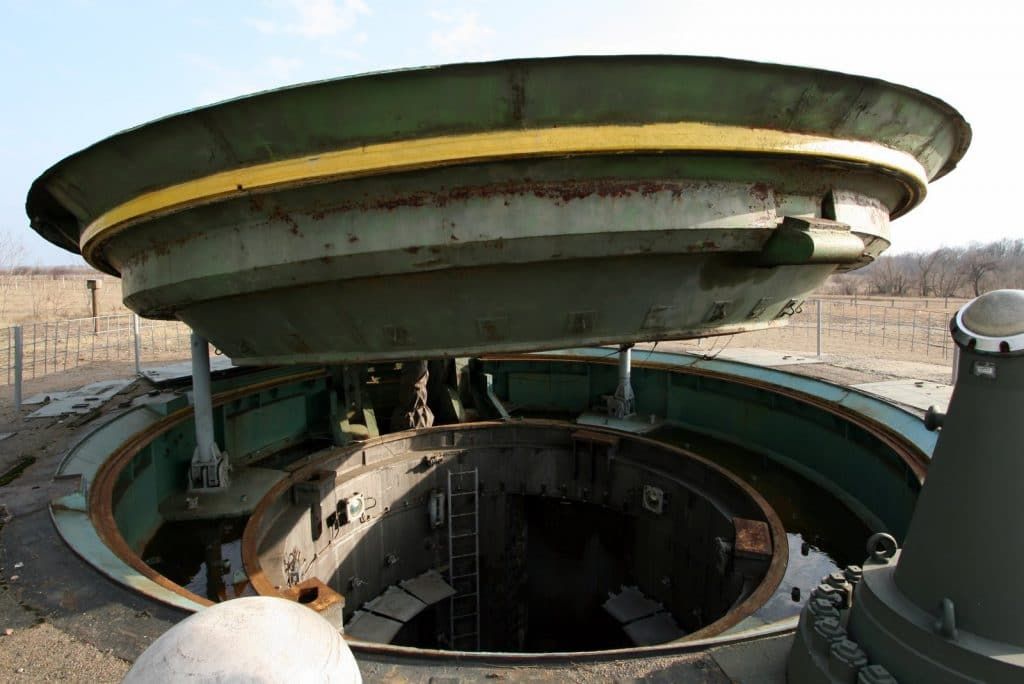Ukraine building a nuclear bomb? Dangerous nonsense.
By Mariana Budjeryn, Matthew Bunn | March 9, 2022
 (Rusted) Missile silo of a SS-24 missile, Strategic Missile Forces Museum in Ukraine. Credit: Michael. CC BY 3.0. Accessed via Wikipedia.
(Rusted) Missile silo of a SS-24 missile, Strategic Missile Forces Museum in Ukraine. Credit: Michael. CC BY 3.0. Accessed via Wikipedia.
The Kremlin is claiming that Ukraine is developing nuclear weapons. Like most of Russia’s other pretexts for invading Ukraine, this is dangerous nonsense.
In his February 21 war speech, Russian President Vladimir Putin stated that Ukraine possesses delivery systems and nuclear technologies inherited from the Soviet Union and that, with foreign support, “it is only a matter of time” before Ukraine creates nuclear weapons. Echoing this concern, Russian Foreign Minister Sergei Lavrov in his address to the Conference on Disarmament on March 1, alleged that Ukraine “started dangerous games related to plans to acquire their own nuclear weapons.”
It is true that Ukraine’s President Volodymyr Zelensky, in his February 19 speech at the Munich Security Conference, questioned whether Ukraine was obligated to retain its non-nuclear status. He argued that Russia had grossly violated its security promises to Ukraine in the so-called Budapest Memorandum that set the terms for Ukraine eliminating the nuclear weapons it inherited from the collapsed Soviet Union. As a result, Zelensky argued, the whole “package of decisions” in that deal, including Ukraine’s non-nuclear status, were “in doubt.”
Prior to President Zelenksy’s recent remark, other Ukrainian politicians have also called for Ukraine’s withdrawal from the Nuclear Non-Proliferation Treaty (NPT) and reconsideration of its non-nuclear status. These statements referred to Russia’s 2014 seizure of Crimea and instigation of a war in Ukraine’s Donbas region, which blatantly violated Russia’s commitments to respect Ukraine’s sovereignty and territorial integrity pledged in the Budapest Memorandum.
These calls, however, yielded nothing thus far and are highly unlikely to result in a change of Ukraine’s nuclear policy in the future. There are good reasons for this. Today, despite the Kremlin’s allegations, Ukraine lacks most of the crucial capabilities necessary for the development of a nuclear weapons program. While Western military assistance is pouring into Ukraine, no one is going to help Ukraine build nuclear weapons, especially as doing so would be a clear violation of the NPT.
Nuclear material. The first point is that Ukraine does not have the needed nuclear material for a bomb or the facilities to produce it. All of the highly enriched uranium (HEU) that used to exist at research and training facilities in Ukraine, including at the Kharkiv Institute of Physics and Technology which Russia recently shelled, was removed cooperatively during the Obama-era nuclear security summit process. Ukraine has uranium deposits, but no conversion facility for turning them into uranium hexafluoride gas used in enrichment plants. It also has no enrichment plants to separate out the uranium-235 used in weapons from the more than 99 percent uranium-238 in natural uranium. Building that set of facilities would take years and great expense.
The alternative path to the bomb is based on plutonium. There’s a good deal of plutonium in the spent fuel from Ukraine’s nuclear power reactors, but it is about one percent by weight in massive, intensely radioactive fuel assemblies. To use it in a bomb, Ukraine would need a “reprocessing” plant to chemically separate the plutonium from all the rest. Once again, that is a facility Ukraine does not have and would take years to build. The plutonium from power reactors is “reactor-grade,” with a variety of undesirable isotopes that make it less than ideal for nuclear weapons, though still usable.
Nuclear warhead production. Even if Ukraine had the needed nuclear material, it would not be easy to turn it into nuclear weapons. Designing nuclear weapons requires specialized expertise. Ukraine has many experts in civilian nuclear matters, but 30 years after Ukraine’s participation in the Soviet military-industrial complex, many of the weapons experts left over are no longer available. Today, Ukraine has modest remaining expertise in the many specialized technologies involved in nuclear weapons design and manufacture.
Nor does it have any of the relevant facilities for those purposes. The enriched uranium or plutonium would have to be converted into metal and fabricated into metal bomb components. Specialty conventional explosives would be needed to set off the bomb, along with detonators with precision timing and a variety of other components. Ukraine does not have facilities for these purposes, and these, too, would be expensive and time-consuming to build.
Delivery vehicles. The nuclear missiles left on Ukraine’s territory when the Soviet Union collapsed were destroyed decades ago. Nevertheless, as President Putin noted, Ukraine has legacy Soviet industries capable of designing and producing weapons delivery systems, both aircraft and missiles. The Antonov design bureau and aircraft manufacturer in Kyiv are known for their cargo aircraft, including the largest airplane ever made, the AN-225 Mriya, that was recently destroyed on the airfield by a Russian strike. The Ukrainian city of Dnipro is home to the Pivdenne Design Bureau, Pivdenmash, once the largest missile factory in the world, capable of producing ballistic missiles. Kyiv’s Luch is the designer and manufacturer of guided missile systems. Today, however, Ukraine has no missiles or aircraft designed to deliver nuclear weapons. Its missile building has been reoriented toward space projects. New missiles or planes would have to be designed and built or existing ones modified.
Treaties and inspections. Beyond all that, Ukraine is committed by treaty not to build nuclear weapons, and all its nuclear facilities are under international inspection. To try to build nuclear weapons, Ukraine would have to either withdraw from the NPT and kick out the International Atomic Energy Agency (IAEA) inspectors or try to proceed in secret, evading the IAEA inspectors, a practice that ultimately proved unsustainable for other states. Either one of these paths would risk sanctions and international censure. Any Ukrainian attempt to launch a nuclear weapons program would lose it the critical support of its Western partners, including the United States, whose decades-long policy has been to thwart the spread of nuclear weapons around the world even by its allies, and on whose support Ukraine greatly relies in its defense against Russia.
With enough motivation, investment, time, and perseverance Ukraine could close the missing links and build a nuclear weapons program. But so could dozens of countries in the world. Even in the best of circumstances, such an undertaking would take years to bring to fruition—and would likely be found and stopped before succeeding. Now, with Russia’s invasion, it’s hard to imagine Ukraine being able to launch and sustain a nuclear weapons program. Today, as in the early 1990s when Ukraine was deliberating its nuclear choices, the costs of such an undertaking would far outweigh the benefits.
Together, we make the world safer.
The Bulletin elevates expert voices above the noise. But as an independent nonprofit organization, our operations depend on the support of readers like you. Help us continue to deliver quality journalism that holds leaders accountable. Your support of our work at any level is important. In return, we promise our coverage will be understandable, influential, vigilant, solution-oriented, and fair-minded. Together we can make a difference.
Keywords: Putin, Russia, Ukraine, nuclear risk, nuclear weapons
Topics: Nuclear Risk, Nuclear Weapons
















